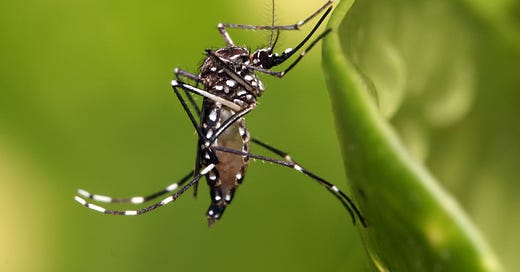Firstly apologies, work and life have been rather dominating so not had much time to pen anything of late. I still have lots of ideas for things I want to write- just not had the time or space to do so. Hopefully once this semester settles I can start writing more regularly again. So I am just going to do a quick round up of three recent stories that caught my eye.
Dengue Fever- a vaccine at last!
First up is a study just out on the trials for a new vaccine for dengue fever. Dengue fever is caused by the dengue virus and is transmitted by the bite of infected mosquitoes particularly the Aedes aegypti species.
Aedes bite in daylight hours (especially early morning/ early evening) and are spreading across the word in part due to climate change (enhancing conditions for their breeding and survival). Due to the prevalence of this mosquito it is perhaps unsurprising that it is thought that about half of the world's population is at risk of dengue and an estimated 100–400 million infections occur/year.
Most people who get dengue the first time won’t have any serious symptoms but it can be pretty unpleasant for those that do get symptoms. Indeed, a common feature of dengue is severe body aches and fever which probably accounts for why dengue is also known as break bone fever. Although most people will recover from the first infection, if they acquire a second infection it can be much more serious.
One reason for this is that there are several serotypes of dengue virus. Immunity to one serotype can cause a worsened outcome to a different serotype. This is due to a phenomenon known as antibody-dependent enhancement (ADE). ADE occurs when an antibody bound to a virus actually helps the viruses to enter and infect cells. Once the virus gets inside the white blood cell, it hijacks the cell and effectively turns it into a Trojan horse. These Trojan horses enable the virus to hide and thrive within the cell and get spread around the body – in effect amplifying and accelerating the course of disease.
ADE has made it extremely challenging to develop a vaccine for dengue. A huge breakthrough has just happened in that a vaccine has been developed that will work against several serotypes. It is a live but weakened type of tetravalent vaccine. An ongoing phase 3 double blinded trial in Brazil evaluated vaccine efficacy against symptomatic dengue of any serotype occurring more than 28 days after vaccination. 16,235 participants were enrolled in the study and they found that a single dose of the vaccine prevented symptomatic DENV-1 and DENV-2 (two different dengue serotypes) through 2 years of follow-up. DENV-3 or 4 were not detected in the follow up. This represents a major breakthrough and a step towards the eradication of this debilitating serious disease!
Measles: a re-emerging threat
The next story is less optimistic however and its about the resurgence in cases of measles. Measles is a potentially deadly infection that was all but eliminated in countries such as the UK thanks to vaccines (full disclaimer my older brother got measles as toddler and was hospitalised as a result with sever pneumonia so I take this disease very seriously). However, vaccine misinformation and disinformation have fuelled vaccine hesitancy and trust in the vaccine which has gradually seen this infection re-emerge in many parts of the world including England, across Europe and the USA. Vaccine hesitancy is only part of the picture though. There have been major issues with vaccine coverage and accessibility. The COVID-19 pandemic hampered capacity and efforts to vaccinate young children. Accessibility still remains an issue and vaccine uptake has been enhanced in countries such as Scotland where measures that were introduced such as flexible working for parents (enabling them to attend vaccination appointments) and mobile vaccination centres. Scotland has almost 95% coverage and has not seen the resurgence that is currently ongoing in England.
Boosters for Sale!
And this point about accessibility leads me to my very last point. Access to COVID-19 vaccine boosters in the UK has been massively restricted. Many individuals are a long way from their last booster and a future plan for vaccine coverage is yet announced. It was therefore great news for some who have wanted vaccines that COVID-19 vaccines and specifically the much touted NOVAVAX vaccine would be available to purchase this spring in the UK for people over the age of 12. Good news for those that want the vaccines but the cost is set to be £45 per inoculation. For a large family, this is a costly process that could quickly spiral. With a cost of living crisis and many struggling to cover bills this asks huge questions about inequalities for those who can afford such measures versus those who cannot.
Vaccine uptake, equity and hesitancy are complex topics and if we have learned anything over the last few years its that you need to continue to actively support people to take up vaccines- whether its making the vaccine centres, appointments or the information about them accessible- surely financial costs should not be another barrier we introduce?






I wish the vaccines were more wildly available. Price should not be a barrier for those seeking to protect themselves
Thank you so much for taking the time to share this. I have been saving for some time in the hope that Covid-19 vaccines to purchase would become available. It’s been well over a year since my children and grandchildren had their last booster. However it shouldn’t be this way; the state of public health is at an all time low and with the Government refusing to take responsibility public health will continue to deteriorate. Covid highlighted the inequality in the UK and sadly it won’t stop there! The UK will fail to be productive because health equality and a productive society go hand in hand.